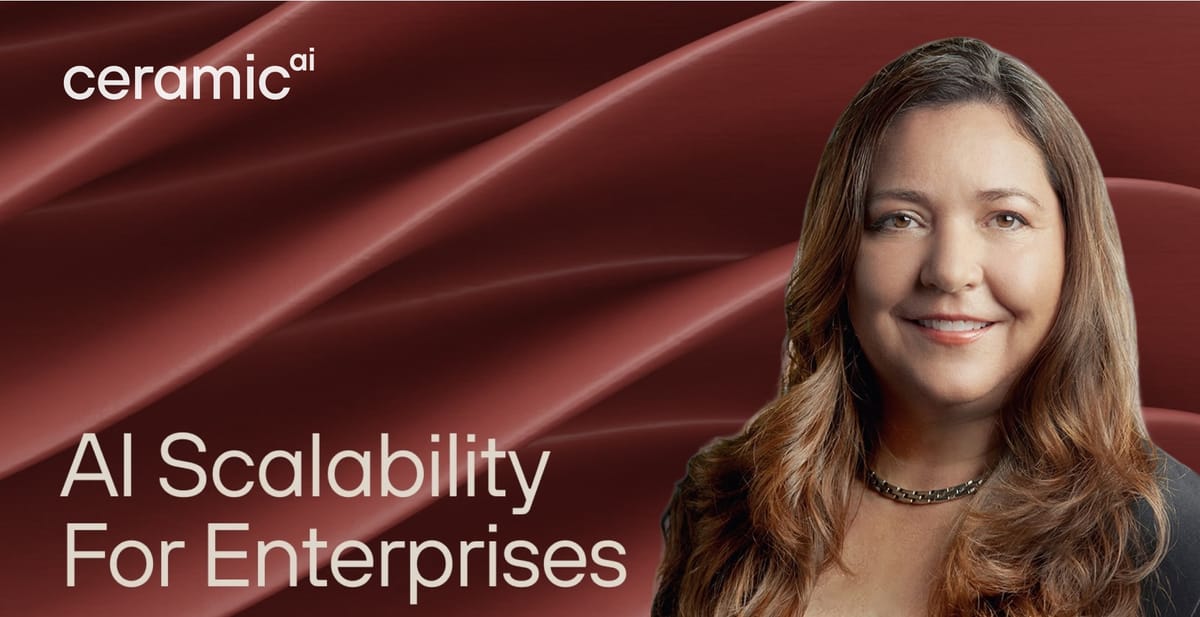
In a San Francisco office far from the spotlight of major AI labs, Anna Patterson has spent the past year quietly building what could become essential infrastructure for the next wave of enterprise AI adoption. Now, the former Google VP of Engineering and Gradient Ventures founder is stepping out of stealth mode with Ceramic.ai, announcing $12 million in seed funding to solve what she describes as the hidden bottleneck in AI progress: inefficient training infrastructure.
Key Points:
- Faster AI Training – Ceramic.ai claims its software trains AI models up to 2.5x faster than existing solutions.
- $12M Seed Round – Investors include NEA, IBM Ventures, Samsung Next, and Earthshot Ventures.
- Enterprise-Focused – The platform is designed to help businesses train AI without massive infrastructure investments.
- Long-Context Advantage – Ceramic.ai can train large models on much longer sequences of data, improving performance and efficiency.
"In the midst of a surge in AI adoption, too many companies are still hindered by barriers to scale – from prohibitive costs to limited infrastructure," Patterson said in the announcement. "We're democratizing access to high-performance AI infrastructure so companies can navigate the complexity of AI training without spending hundreds of millions in research and engineering resources."
If the promise holds true, Ceramic.ai could help level a playing field that has increasingly tilted toward a handful of tech giants with seemingly unlimited resources to pour into AI development. The startup is tackling a problem that's less visible than the race for bigger models or more impressive demos, but potentially more important for mainstream adoption: making AI training infrastructure fundamentally more efficient.
Patterson's career trajectory makes her uniquely qualified for this challenge. After building search engines for nearly two decades, she launched Google's AI-focused venture capital arm Gradient Ventures in 2017 – years before the current AI boom – giving her visibility into hundreds of AI startups and their technical challenges.
Her decision to leave Google reportedly came after a health scare in 2023 that prompted a personal reassessment. "I think whenever your life takes a break, you're like, OK, what part of my soul do I want to feed," Patterson told SF Times. "I think the happiest times in my life are starting something small and new."
While the concept of "AI training infrastructure" might sound like a narrow technical niche, it addresses what industry experts increasingly recognize as the primary constraint on AI adoption. Global AI investments are projected to surge from $16 billion in 2023 to an estimated $143 billion by 2027, yet 74% of companies still struggle to scale AI effectively, according to figures cited by Ceramic.
The core technology claim is bold: Ceramic says its platform makes AI training up to 2.5 times faster on NVIDIA H100 GPUs than current state-of-the-art platforms. But the more significant advancement might be its approach to training models with longer context windows – allowing AI to process and understand more text at once – an area where most existing systems struggle with diminishing returns.
"Most infrastructure can scale up to 10x, but not 100x—and true exponential growth demands a complete redesign," Patterson wrote in the company's launch post. The platform reorders training data so each micro-batch is aligned by topic, supposedly increasing the efficiency of how models learn.
The technology has already shown promising results. The company claims it fine-tuned Meta's Llama 70B model and achieved a 92% exact match score on the GSM8K mathematical reasoning benchmark, up from the base model's 78% and outperforming DeepSeek's R1 at 84%.
Lila Tretikov, Partner and Head of AI Strategy at NEA, which led the funding round, described the current state of AI in colorful terms: "AI's meteoric ascent has been like a rocket tethered to a horse-drawn carriage – until now."
Other investors include IBM, Samsung Next, Earthshot Ventures and Alumni Ventures, suggesting confidence in both the technology and the potential market.
"Our investment in Ceramic demonstrates how IBM drives innovation and solidifies partnerships in highly strategic areas," said Emily Fontaine, Vice President and IBM Global Head of Venture Capital. "We are thrilled to collaborate with Ceramic to address a critical need to reduce AI compute costs, making training more efficient and accessible."
The lean team – just reaching double digits last week – will use the funding to expand engineering capacity and strengthen industry partnerships. Ceramic.ai is already working with Lambda, AWS and other infrastructure providers to make their solution more readily accessible.
Patterson has a bold vision for the future of enterprise AI. In an interview with AIM Research, she predicted that "by 2030, every major enterprise will have its own proprietary foundation model." Currently, only a few tech giants can afford to train custom models, but as infrastructure becomes more efficient, Patterson believes businesses will no longer depend on third-party models.
Whether that prediction comes true may depend on companies like Ceramic.ai successfully removing the barriers that have kept custom AI development out of reach for most enterprises. As Patterson put it: "If AI adoption were a baseball game, we'd still be singing the national anthem."

